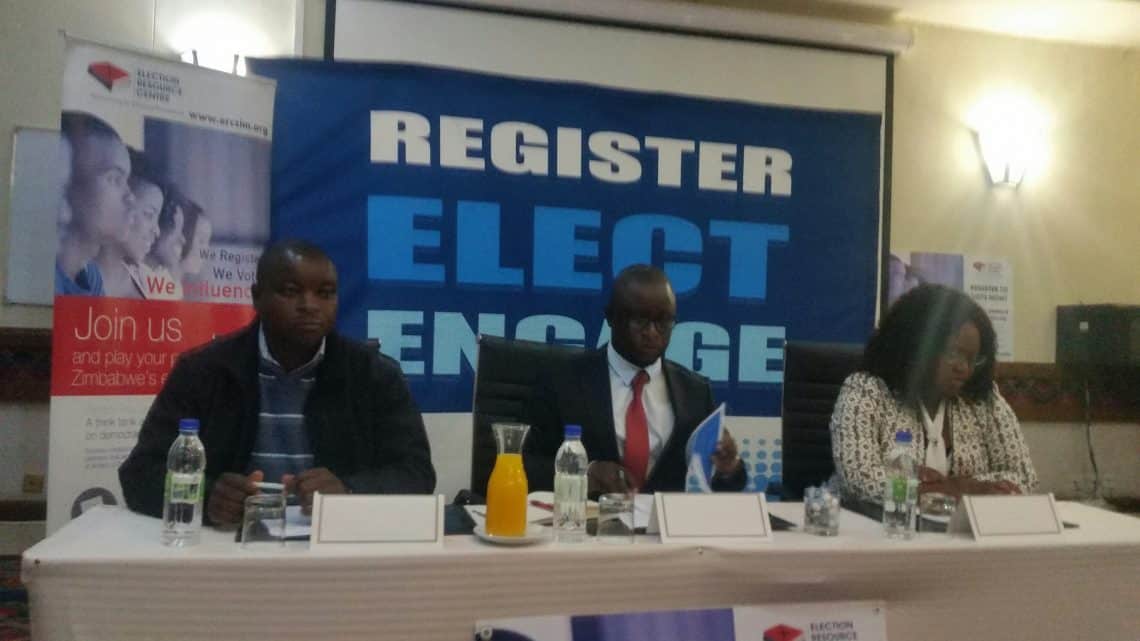By Byron Mutingwende
The Zimbabwe Electoral Commission (ZEC) should improve on transparency and accountability in order for it to pass the test of a credible, fair and transparent electoral management body.
This emerged at the launch of the fourth edition of the Election Reform Barometer produced by the Election Resource Centre (ERC) in Harare on 7 June 2018, which focuses on tracking adherence to international principles and legislative framework.
“The calls are on ZEC to improve on transparency and accountability. It should review some of the administrative issues. One does not need to change laws to implement certain reforms. In that vein, the bulk of the issues of reforms being called for by the likes of the MDC Alliance are within ZEC’s purview to address. The credibility, fairness and freeness of the upcoming elections is in the hands of ZEC depending on how it will implement the necessary reforms,” Tawanda Chimhini, the Director of ERC said in response to a question fielded to him during the launch.
Chimhini praised the prompt responsiveness of ZEC to logistical issues like transport and lighting at polling centres but urged the electoral management body to extend the same to issues like disclosure of the list of people recruited and trained to conduct voter registration and to provide for exhaustive exchanges at stakeholder meetings.
The Election Reform Barometer (ERB) tracks pertinent electoral processes assessing adherence and compliance with internationally accepted best practice and, Zimbabwe’s legislative framework. The tool, launched in the first half of 2017, allows for evidence-based advocacy targeted at policymakers towards improved electoral processes in the country. The ERB also focuses on key areas essential to the conduct of credible, free and fair election.
In his introductory speech during the launch, Collen Chibango, the ERC Researcher said the fourth issue of the ERB done from January to April 2018, assessed eight indicators that include the voters’ roll; voter education; hate speech, political tolerance, violence and intimidation; vote buying; media access; election administration; and political parties’ campaign financing in districts like Mutasa, Mutare, Chiredzi, Umzingwane, Tsholotsho and Silobela.
Chimhini said the findings of the fourth ERB indicate moderate improvements in five of the indicators tracked.
“The ERB notes improvements in electoral election administration, political tolerance, voter education, hate speech and voter registration indicators. The indicators around intimidation, campaign financing, media coverage and vote buying were negative, denting overall progress in terms of preparations for the 2018 elections,” Chimhini said.
During the assessment, the ERC noted reports indicating rampant vote buying, lack of transparency and accountability on party campaign financing and intimidation associated with demand for voter registration certificates serial numbers. Overall, the fourth edition of ERB finds an above average rating compared to the average rating of the third edition.
Among the positive findings are a commendable BVR exercise that set the framework for an accurate, complete and current voters’ roll and the fact that 73, 5% of eligible voter population registered to vote at the conclusion of the mop-up exercise in February 2018. There was moderate political tolerance amongst citizens and election stakeholders although reports of intra-party violence were recorded. The election management was also largely competent, professional and credible but lagged behind on transparency and accountability.
There is also a plethora of negative findings. A majority of citizens in rural communities expressed fear of violence and intimidation associated with the upcoming elections. This was despite a largely violent free environment during the assessment period. There was rampant vote buying particularly in rural communities.
“There was intimidation of citizens through demand of serial numbers by ZNU PF; and, low voter registration rates in Harare (63%) and Bulawayo (59%) which signalled voter suppression in urban areas. Political party financing is not transparent, and parties are not accountable for public resources they receive. Hate speech was prevalent at political party rallies through party slogans although limited in communities and among citizens. Overall, the findings reflect an average score,” Chimhini said.






